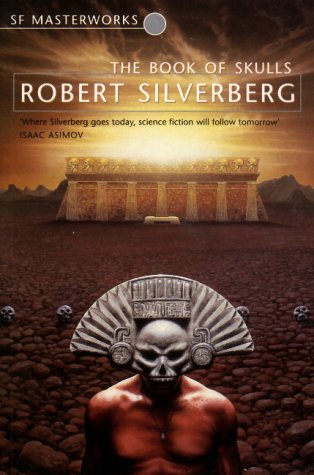Me only cruel immortality consumes
-- from the poem Tithonus by Alfred, Lord Tennyson.

The Book of Skulls
By Robert Silverberg
When I glanced up at my neighbour's door a couple of weeks ago, I saw a small skeleton hanging on a string with an over-sized grinning skull in a faintly "Mexican" style. It was Halloween. Then I thought of the book I was reading, Robert Silverberg's "The Book of Skulls". An apt book for this time of year.
Here we have a road-trip from New York to Arizona with four young men, college room mates, chasing the possibility of eternal life. One of the young men, Eli, found an obscure manuscript in the bowels of a university library and managed to translate some of its message: could it be a promise of immortality? Also, there seems to be a catch.
The four are mismatched and quite different: we have the New York Jew (Eli), clever but not confident; Oliver, the middle American country boy, driven to learn but scared of death; Ned, a homosexual who enjoys taking both or all sides in a perverse way; and Timothy, the east coast American rich boy, born to wealth, with a stand-offish outlook to the whole trip. Silverberg structures the narrative such that each of them takes a turn to speak their mind to us. And so we learn about them: of their various backgrounds, neuroses and loves. The close proximity during the journey leads to friction, resignation, dread and lust (and book has plenty of lust and sex). There is a weight on everyone as the journey progresses; a weight that gets heavier. The reader also starts feeling this; a dread of expectation which ratchets up when the destination is reached.
Although the novel is published here in the Gollancz "SF Masterworks" series, it is not science-fiction, and I would struggle to label it "fantasy". Like the old Memento Mori works of old, Silverberg meditates on death through the eyes of his four young student protagonists. The search for immortality is something with a long pedigree, and a fantastic one at that.
This novel was "easy" to read in so far as it is written well. The multiple narratives split the text up into short chunks. However, I also found it a "tough" read, possibly also due to being in each person's head in turn and starting to feel unsettled about where we were going with the story. You have to think about what it might mean to achieve this goal. At one point, Eli starts to consider all the things he will do if he gains immortality: twenty years of fitness training, twenty years of learning an instrument etc. In a hundred years or so, surely we will be on the Moon or Mars, so getting off Earth. It quickly becomes apparent how long eternity actually is. Do we want that? I do not think any human being is ready for immortality. An unsettling novel.
As for Tithonus :
From Google :
Tithonus was a Trojan prince in Greek mythology who was granted immortality but not eternal youth by Eos, the goddess of dawn, whom he loved. As a result, he continued to age indefinitely, eventually becoming a weakened, shriveled being whom Eos eventually transformed into a cicada out of pity.
From Alfred, Lord Tennyson's poem Tithonus :
The woods decay, the woods decay and fall,
The vapours weep their burthen to the ground,
Man comes and tills the field and lies beneath,
And after many a summer dies the swan.
Me only cruel immortality
Consumes: I wither slowly in thine arms,
Here at the quiet limit of the world,
A white-hair'd shadow roaming like a dream
The ever-silent spaces of the East,
Far-folded mists, and gleaming halls of morn.



